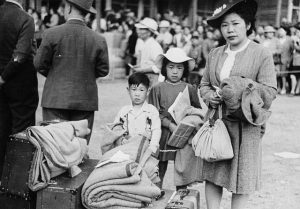Japanese Problem is delicate production, but it packs a punch.
After the Japanese attack on Pearl Harbor in December of 1941, thousands of Canadian citizens of Japanese origin were removed from the West Coast and forced to live in internment camps in the BC interior and elsewhere in the country. This was despite the fact that the RCMP said there was no evidence of spying or other fifth-column activity in the community. The citizens’ property, including homes and the sizeable fishing fleet from Steveston, was confiscated and sold—presumably to pay for their incarceration, although greed and racism were clearly factors. And these innocent people were not allowed to move freely within Canada until 1949.
In 1942, before they were shipped off to places like New Denver, 8,000 Japanese Canadians were temporarily housed in animal barns at the PNE. Japanese Problem, which is billed as a site-responsive play, unfolds in one of those barns, which is now called the Livestock Building.
We meet a handful of characters who are based on historical figures: a young woman named Sam wants to be a dancer; Kenji (Ken) came to Vancouver to further his studies; and Maggie is a nursing assistant. They are all incarcerated. Johnny is a white guy, a former bandleader turned military man who is uncomfortable with his authority in the barn.
As the audience follows the performers from one stall to the next and scenes unfold, you start to get a visceral sense of the shock and humiliation detainees must have experienced.
Yoshié Bancroft, who plays Sam, delivers a performance that is still, but full of feeling. In one of the most touching images, Sam stands in a large, dark room. It’s chilly and there’s water on the floor. Sam’s sick but she begs Maggie not to tell anyone: she is afraid of being quarantined and dying without ever making it home.
There’s an interesting combination of stylistic innocence and harsh information in Japanese Problem. Kids suspected of having tuberculosis were quarantined in a basement room, which their parents weren’t allowed to visit. We meet these kids in the bright colours and high contrast of shadow puppetry that uses overhead projectors.
In a couple of the most interesting directorial moments, director Joanna Garfinkel allows the actors to stand silently for daringly long passages.
There’s also a metatheatrical level that doesn’t always work as well. Nicole Yukiko breaks out of character as Maggie a couple of times, for instance, to say that the effects of intergenerational trauma make it hard for her to continue. These moments lay claim to a reality outside the performance, but they are clearly artificial, which undermines their impact. It might have been a stronger choice to convey this information without the falsifying device.
And the minimalist romance that develops between a couple of the characters feels to me like a too-easy storytelling trope.
But lived experience keeps asserting its presence. Brent Hirose shows us a slide of his dapper grandfather walking down a street in New Westminster, for instance. That handsome businessman, that actor’s father, was incarcerated.
There’s nothing like personal witness and that’s what made the talkback session the night I attended Japanese Problem such a crucial part of the event. Several people shared their connections to the history: one woman’s mother was born in an internment camp, another’s mom was held in the Livestock Building. A man showed a photo of the transit card that his father needed in order to travel within Canada after the war.
Several white people expressed astonishment that they had never heard of this incarceration. Obviously, we all need to hear about it, and to understand its implications—in terms of ongoing Japanese-Canadian experience, the current global response to refugees, and the political expediency of dehumanization. Heartfelt thanks to Japanese Problem for using art to increase awareness.
JAPANESE PROBLEM Created by the company. Directed by Joanna Garfinkel. Produced by the collective Universal Limited in the animal barns at the PNE on Sunday, September 24. Continues until September 30.
Get your tickets here.






0 Comments